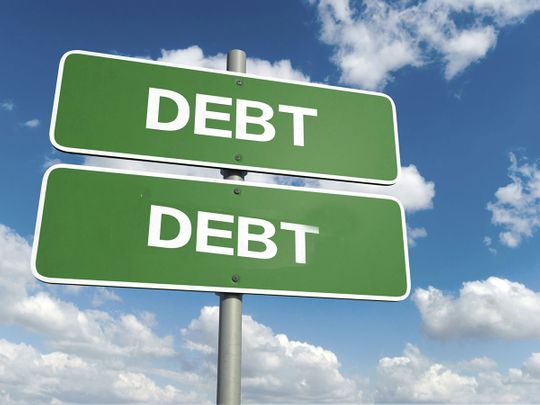
Dubai: Debt management plans (DMP) and bankruptcy are two tools designed to help financially stressed people get out of debt, but they work very differently.
However, if you’re trying to decide between starting a DMP or filing for bankruptcy, here are some key things to know. The ability to build and attain credit gives consumers purchasing power, but it can also be a slippery slope.
If you’re like those whose debt has crept up higher than it’s possible for you to pay off, you may be considering bankruptcy. But before making a decision, knowing your options will help you make a better, more informed choice.
The first question you should ask yourself: Is debt management better than bankruptcy? While the best answer to this is better done case by case, for many, debt management programs are a more effective and safer option.
Bankruptcy can have a long-lasting impact
Filing for bankruptcy may clear your credit, but there are plenty of negative repercussions to think about before going this route.
Although declaring bankruptcy keeps creditors from trying to collect, there are some variations on what you can expect depending on what type of bankruptcy you file for.
However, keep in mind that a bankruptcy can live on your credit report for up to a decade or even more. Because the information contained in bankruptcy case documents is a matter of public record.
Another caveat is that potential employers and landlords may be able to see that you’ve filed, potentially impacting your ability to find a job and housing.
In most cases, you cannot file for bankruptcy until you’ve undergone credit counselling. However, credit counselling can offer an alternative path for climbing out of debt and taking back control of your financial well-being without the negative impact of declaring.

Benefits of a debt management program (DMP)
With a debt management program, you work with counsellors to consolidate unsecured debt – credit cards, medical bills, collection accounts, and personal loans – and pay them down in three to five years.
Another perk? Counsellors are also expert negotiators and can often get your interest rate knocked down.
The caveat of a debt management plan is if you don’t follow through, it doesn’t work. But if you are consistent with your repayment, over time, your credit score will recover to a healthier number.
However, there are some rules you should remember when embarking on this option – don’t forget to make your payments on time, and credit cards are only for emergencies. Whatever you choose, it’s a step toward a healthier financial future.
One key disadvantage of a debt management plan is that your debts must be repaid in full – they will not be written off.
Secondly, creditors don’t have to enter into a debt management plan and may still contact you asking for immediate repayment. Also, mortgages and other ‘secured’ debts are not covered by a debt management plan.
Can I afford a debt management plan?
You can only enter into a debt management plan if you have some money left over every month once all your essential expenses have been paid.
It’s a good idea to draw up a budget, including your monthly income and all your essential monthly household expenses, for example, your mortgage, rent and utility bill payments.
If you have a very small amount left over after all these have been paid – or nothing at all – you should consider other ways to manage your debts.
Before starting a plan, the DMP operator should make clear to you the terms and conditions, including how much money you’ll be expected to pay each month and for how long the reasons the provider might stop operating the plan for you, for example, if you don’t make the required monthly payments.

When to consider debt settlement or bankruptcy?
If your monthly debt payments, excluding mortgage or rent, exceed 20 per cent of your income, you have a debt problem that requires action.
The seriousness of the problem, and your ability and commitment to overcoming it, will determine whether a debt settlement plan or bankruptcy is the better option.
Here are some scenarios in which debt settlement may provide the better path out of debt:
• You’re able and willing to negotiate with creditors or debt collectors on a settlement plan that you can afford.
• Your creditors will agree to greatly reduce your debt burden in exchange for your commitment to make a lump-sum payment.
• Your income is stable enough that you can continue to pay your mortgage or rent and other essential bills in addition to the payments required under a debt settlement, while still saving some money for emergency expenses.
Here are some scenarios in which bankruptcy is the better option:
• All other options for debt relief have been exhausted or deemed insufficient, making bankruptcy protection a ‘last resort’.
• You’re at risk of losing your home to foreclosure, but bankruptcy can help you get caught up on your payments.
• Making debt payments would require you to dip into your emergency or retirement savings.
• You cannot make any payments on your debt without resorting to short-term loans, which charge exorbitant interest rates.
• You’ve lost your job and lack the means to make debt settlement payments. Any attempt to get out of debt is going to take more than five years.

Bottom line
Any repayment plan will have an impact on your credit, but bankruptcy in particular has a fairly catastrophic impact on the future of your credit score. As time goes by, those negative marks will hurt you less, but it will take time to rebuild your credit.
With a debt management plan (DMP), you can typically expect your score to drop slightly at the beginning of the plan. This is because the included creditor accounts are closed, which can drop your score. As you maintain your DMP, however, your score will usually go up.
However, if your credit score is already low and using credit again isn’t something you see yourself worrying about in the coming years, it may not make that big of a difference.
So although filing for bankruptcy is a more challenging way forward, if you’re deeply underwater and trying to protect your home and other essential assets, it may be the right way out.
A debt management plan, on the other hand, is cheaper and simpler to start. It’s also easier to quit if you want to try something else.












